|
|
|
Sort Order |
|
|
|
Items / Page
|
|
|
|
|
|
|
| Srl | Item |
| 1 |
ID:
137272


|
|
|
|
|
| Summary/Abstract |
As the threats of climate change grow, the need to reduce carbon dioxide (CO2) emissions from fossil fuel burning is increasingly acknowledged by governments around the world. The potential of carbon capture and storage (CCS), a set of technologies that offers a politically appealing vision of a ‘cleaner’ way to use fossil fuels, has provided powerful motivation for large public and private investments in CCS technology. But investing in CCS is controversial because, although some consider it a critical climate mitigation technology, others view it as an expensive fossil fuel subsidy that could inadvertently perpetuate, rather than reduce, fossil fuel reliance.
|
|
|
|
|
|
|
|
|
|
|
|
|
|
|
|
| 2 |
ID:
137266


|
|
|
|
|
| Summary/Abstract |
For many years, the EU pursued the strategy of ‘leading by example’ in international climate negotiations. Climate policy has generally been seen as one of the few policy fields in which the EU is able to develop coherent positions and speak with a single voice. Since the Copenhagen climate summit, however, frictions inside the EU and a paradigm shift have become increasingly evident. With the October 2014 compromise in the European Council on a new framework for 2030, the international climate negotiations have become less important and a more incremental domestic approach has prevailed.
|
|
|
|
|
|
|
|
|
|
|
|
|
|
|
|
| 3 |
ID:
137274
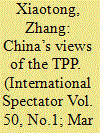

|
|
|
|
|
| Summary/Abstract |
The Chinese policy and academic communities have mixed views about the US-led TPP, either viewing it as a strategic attempt at encircling China, or as a positive spur for domestic reform and opening-up. Although the Chinese government adopted an open and flexible attitude towards the TPP, it has moved strategically by accelerating the negotiations of the RCEP and China–Korea FTA, as well as updating its FTA with ASEAN. A more interesting development is China’s new initiatives for building two grand silk roads, one to Central Asia, leading on to Europe, and the other to Southeast Asia, leading on to the Indian Ocean. Both represent China’s renewed confidence in finding its role in Asia.
|
|
|
|
|
|
|
|
|
|
|
|
|
|
|
|
| 4 |
ID:
137275
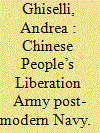

|
|
|
|
|
| Summary/Abstract |
Developments at both the doctrinal and operational level suggest that the ‘post-modernisation’ of China’s PLA Navy (PLAN) has started. Issues such as the maritime disputes in the East and South China Seas and how to create a network of bases or ‘footholds’ outside Asia might slow down or temporarily halt this process. However, as China’s economic presence expands on a global scale, its security interests and those of the international community will overlap increasingly with one another. Consequently, once its transformation has been completed, the PLAN is likely to become a global and cooperative force.
|
|
|
|
|
|
|
|
|
|
|
|
|
|
|
|
| 5 |
ID:
137268
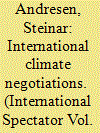

|
|
|
|
|
| Summary/Abstract |
Most observers agree that more than 20 years of UN climate negotiations have been a failure. Some argue that the top-down approach is one important reason for this and that a bottom-up approach or more exclusive club approaches would have rendered better results. Based on experience with these approaches so far this is far from self-evident and there are limits to what can be achieved by clever institutional design when deep-seated political conflicts prevail. Many approaches are also hybrids between the various approaches and the future climate regime will probably contain elements of both the top-down and the bottom-up approach. However no quick fixes can be expected for this exceedingly ‘malign’ problem.
|
|
|
|
|
|
|
|
|
|
|
|
|
|
|
|
| 6 |
ID:
137267


|
|
|
|
|
| Summary/Abstract |
The United States and China recently announced a joint climate agreement that creates unprecedented political momentum for the Paris COP21 to be held in December 2015. Yet, it is unclear whether such a deal is an historic breakthrough or business as usual policy. A closer look at the US-China climate agreement shows that the chances that the agreed measures have of limiting global warming to 2°C are very few. If seen in terms of concrete policy action, the US pledge comes closer to a pathway compatible with a 2°C target. By contrast, however, China’s pledges are far from consistent with a 2°C pathway. As the COP21 approaches, it is becoming clear that China matters more than ever for an effective climate deal. But it is also becoming increasingly clear that, in the best case scenario, Beijing will support a start now/sprint later agreement in Paris.
|
|
|
|
|
|
|
|
|
|
|
|
|
|
|
|
| 7 |
ID:
137269


|
|
|
|
|
| Summary/Abstract |
Institutional mechanisms for administering international climate finance constitute key components of an effect global climate regime, and the Green Climate Fund represents what promises to become the most important such mechanism. As the Fund begins to serve its function of transferring economic resources from developed to developing countries to support mitigation and adaptation activities, it faces several obstacles. Since contributions to the Fund by states or private parties are voluntary, they are not necessarily based on the UN Framework Convention on Climate Change’s “common but differentiated responsibilities” principle. Its governing instrument also departs from UNFCCC principles. In addition, the Fund faces a significant ambition gap in pledges to fund its operations. By instantiating several informal means of applying climate justice norms to assessments of national contributions to climate finance, some of this resistance might be overcome, increasing support for the Fund and, with this, increasing prospects for reaching consensus on a new climate treaty architecture at COP 21.
|
|
|
|
|
|
|
|
|
|
|
|
|
|
|
|
| 8 |
ID:
137270
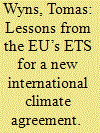

|
|
|
|
|
| Summary/Abstract |
Intended nationally determined contributions (INDCs) for mitigation of greenhouse gas emissions are expected to be an important part of a post-2020 climate agreement under the UNFCCC. However, it is not certain yet what these INDCs will contain and how they will be assessed. The EU Emissions Trading System (EU ETS) faced similar challenges in its first years (2005-12). Thus, the mechanisms and lessons learned under the EU ETS could be applied to the INDCs to create a governance and assessment system that increases transparency and builds trust among parties to the UNFCCC.
|
|
|
|
|
|
|
|
|
|
|
|
|
|
|
|
| 9 |
ID:
137271
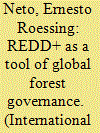

|
|
|
|
|
| Summary/Abstract |
Given the lack of a multilateral convention on forests, global deforestation is being addressed through various initiatives, public and private, local and global. Since 2005, the creation of a mechanism for addressing deforestation (among other things) has been moving forward within the United Nations Framework Convention on Climate Change (UNFCCC) regime. Known as REDD+, it is meant to provide incentives to developing countries in return for forest conservation, with the goal of reducing greenhouse gas emissions. REDD+ could lead to lower levels of deforestation and forest degradation, and to the incorporation of customary governance arrangements in national policy instruments, albeit with some risk of centralisation of forest governance. It could also have a negative social and environmental impact if too much emphasis is put on carbon without adopting the proper social and environmental safeguards.
|
|
|
|
|
|
|
|
|
|
|
|
|
|
|
|
| 10 |
ID:
137273


|
|
|
|
|
| Summary/Abstract |
In order to assess whether the Arctic region is evolving into a region of cooperation or one of confrontation, a thorough understanding of the existing (and evolving) bilateral, regional and international institutional frameworks with relevant regulations for the Arctic and their adequacy for solving possible controversies is paramount. Disputes can flare up over various issues, as the Arctic has aptly demonstrated in recent years. Whether these disputes erupt into conflict or are handled cooperatively depends significantly on the rules and regulations that parties have put in place. While most of the literature deals with resource ownership, it is argued here that the more significant potential sources of controversy between Arctic states are issues of responsibility, liability, precaution and preparedness concerning possible transboundary environmental risks and dangers and, generally, protection of the fragile Arctic ecosystem.
|
|
|
|
|
|
|
|
|
|
|
|
|
|
|
|
|
|
|
|
|